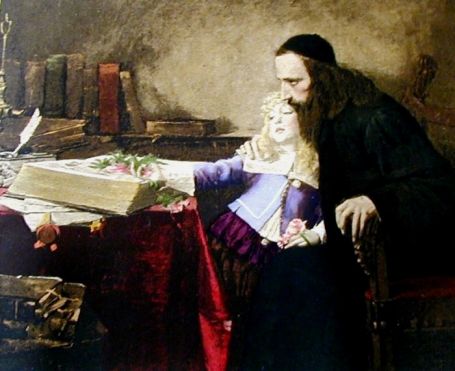Difference between revisions of "Acosta, Uriel (c.1585-1640)"
Tao alexis (talk | contribs) (Created page with "'''Uriel Acosta''' was a Jewish writer and opponent of traditional Judaism who was born at Oporto, Portugal in 1590. He was the son of a crypto-Jewish ecclesiastic; upon his...") |
Tao alexis (talk | contribs) |
||
| Line 1: | Line 1: | ||
| + | [[File:Uriel Acosta.jpg|right|455px|thumb|Uriel Acosta instructing the young Spinoza]] | ||
'''Uriel Acosta''' was a Jewish writer and opponent of traditional Judaism who was born at Oporto, Portugal in 1590. He was the son of a crypto-Jewish ecclesiastic; upon his father's death, the family went to Amsterdam and openly professed Judaism. | '''Uriel Acosta''' was a Jewish writer and opponent of traditional Judaism who was born at Oporto, Portugal in 1590. He was the son of a crypto-Jewish ecclesiastic; upon his father's death, the family went to Amsterdam and openly professed Judaism. | ||
Revision as of 21:01, 7 May 2023
Uriel Acosta was a Jewish writer and opponent of traditional Judaism who was born at Oporto, Portugal in 1590. He was the son of a crypto-Jewish ecclesiastic; upon his father's death, the family went to Amsterdam and openly professed Judaism.
Hoping to return to the pristine faith of the Bible, Acosta denied the traditions of rabbinic law, writing works that denied the immortality of the soul. His heresy caused him to be arrested and fined by the city magistrates, who considered his doctrine to be neither Christian nor Jewish; his books were publicly burned.
Acosta fled to Hamburg, but soon returned to Amsterdam, where in 1633 he offered to submit to the synagogue. He was unable, however, to conform to the accepted doctrine and was excommunicated. He lived in social isolation for seven years. He then capitulated to the synagogue again, but was banished by the authorities for his heterodoxy, his deviation from accepted standards or beliefs. He committed suicide in Amsterdam in 1647. Towards the end of his life he was a tutor to many promising philosophers, including Baruch Spinoza. He left behind a story of his own life, Exemplar humanae vitae, which at the time of the game world remains unpublished.
